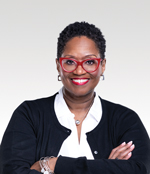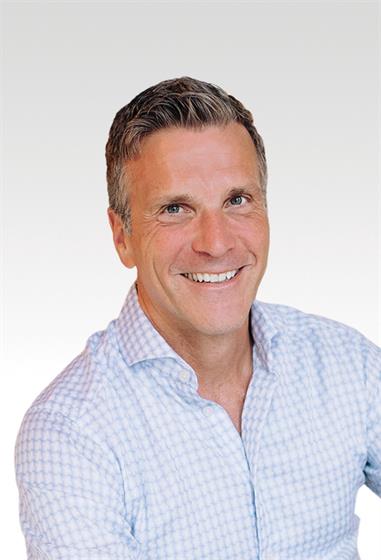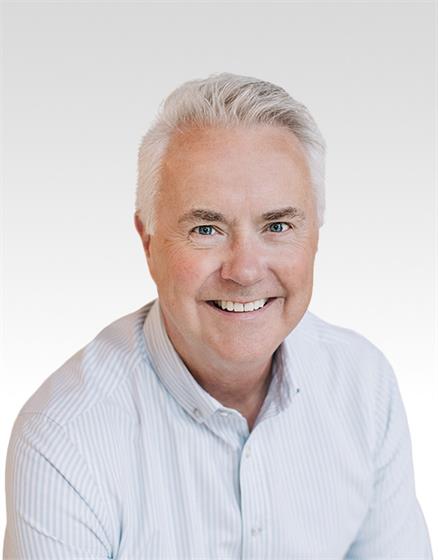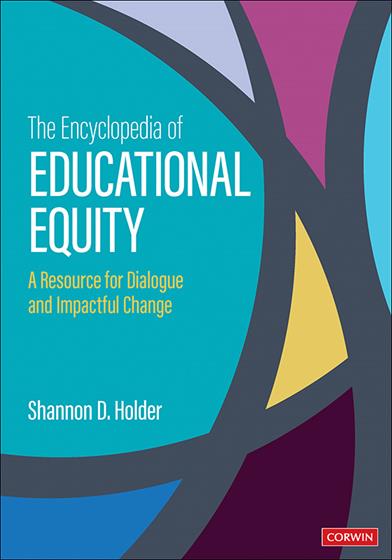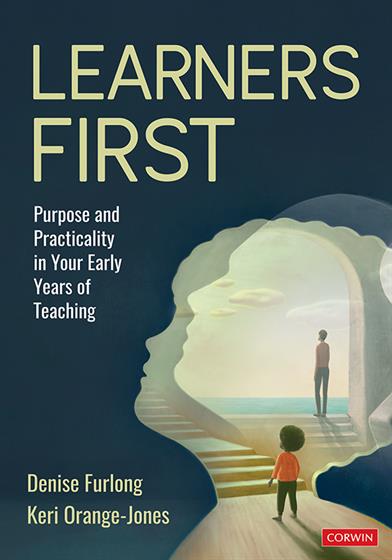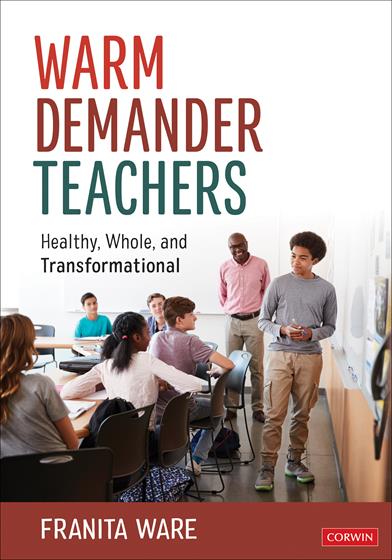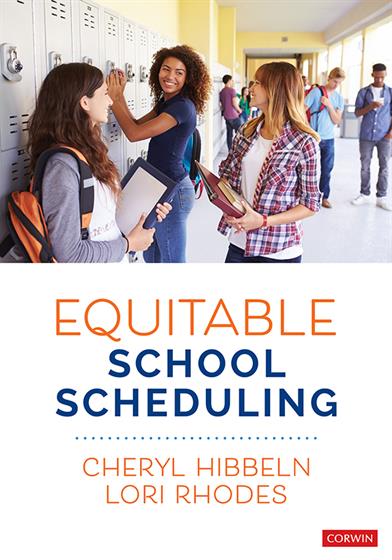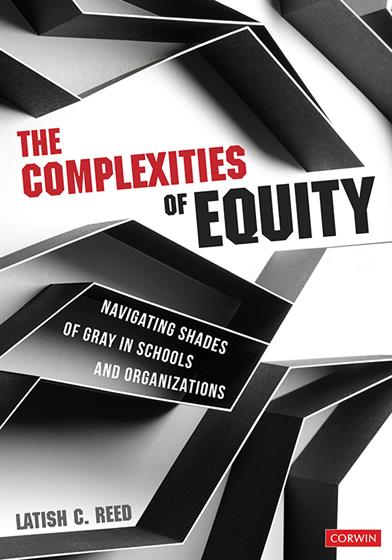LATISH REED: We know that the Civil Rights movement was all about gaining equality, gaining access. But equity is more about,
OK, if we give everybody the same, we're still going to have uneven outcomes. And so what equity is all about is
going back and saying, OK, what does this particular group need in order to move forward?
SPEAKER: Welcome to Corwin's Leaders Coaching Leaders podcast with hosts Peter DeWitt and Michael Nelson. This
podcast is from education leaders for education leaders. Every week, Peter, Mike, and our guests get together to
share ideas, put research into practice, and ensure that every student is learning not by chance but by design.
PETER DEWITT: Dr. Latish Reed, welcome to Corwin's Leaders Coaching Leaders podcast.
LATISH REED: Thank you for having me. I'm so excited for today's conversation.
PETER DEWITT: We have so much we want to get into, especially in your work around equity, which is going to be mind blowing
for sure for this conversation, especially during 2025. But I want to know, so you were a school leader in
Milwaukee, can you give us a little bit of your background?
LATISH REED: Sure. So I was a school teacher, I taught middle school. So I'm a special educator. When you do middle school,
you are a special teacher.
And so I did sixth, seventh, and eighth grade. I also was a school administrator, assistant principal. I had one of
the best principals ever, Mr. Anderson, my leader and mentor. And then I decided to take a little veer off, and I
went back to school full time at the University of Wisconsin, Madison, and I got my PhD in educational leadership
and policy analysis.
Then I spent some time in the professorate. And then I became the Milwaukee Public Schools first equity
administrator, and I was the equity specialist for the entire district.
PETER DEWITT: Wow. Can I ask you a follow up question on that? So first of all, congratulations on all of it. What was it like to be
the first equity administrator in the schools in Milwaukee?
LATISH REED: So the first meant that you really had to do a lot of professional learning around what equity is, because often,
people and they still confuse equity with equality. And so we know that the Civil Rights movement was all about
gaining equality, gaining access. But equity is more about, OK, if we give everybody the same, we're still going to
have uneven outcomes.
And so what equity is all about is going back and saying, OK, what does this particular group need in order to
move forward or to make that progress and have those outcomes that we're seeking? And so we did a lot of
professional learning about the differences.
And then also just really getting people to understand that within their own spheres of influence, that's where the
change happens. Right now equity is this big pie in the sky thing that we keep talking about when it's really about
understanding what it is that you control, what you influence, and then understanding how to make those tweaks
and changes that will result in more equitable outcomes for everyone.
MICHAEL
NELSON:
What I wish, Peter, I wish that if you're listening to this in the car that you continue to listen to it, but then you
take time to actually watch it because Dr. Reed, as you talk, you are so expressive in your nonverbals and your
hand gestures that I'm making such more additional meaning by how you represent that.
And what I hear you saying is, boy, you had to build a lot of shared understanding that base and knowledge
about what equity is. And congratulations to you on leading that. And you succinctly in about, boy, maybe 60
seconds described that.
But your journey to this book that's going to come out in April,T he Complexities of Equity, Navigating Shades of
Gray in Schools and Organizations was a journey for you, and it was not something that you did in six months. It
was a journey over years and years. And so even though you succinctly described things in 60 seconds just a
moment ago, this book must be so important to you that you took years to develop this journey.
Could you describe for our readers listening about this journey and why not six months versus several years?
LATISH REED: So I started writing the book in 2017 in my second year of being the equity specialist. And the reason why, I
thought about all of my training. So I went to the top school in the nation, the University of Wisconsin at Madison,
shout out to the LPA department.
MICHAEL
NELSON:
Are they badgers?
PETER DEWITT: No worries.
LATISH REED: Badgers, yes.
MICHAEL
NELSON:
Yes. OK, Peter. Badgers.
LATISH REED: We're not all able. But what I would like to say, though, literally, I had some of the best professors in the world.
Colleen Capper my dissertation chair. Rich Halverson, just all that team was phenomenal in really teaching us
what school should look like.
They trained us to research and read the literature and do all those things. But then when you get into the space
and you start saying these things, it becomes problematic because what equity really is about is asking people to
do something different than what they've been doing. So I while I was doing the work, I was like, I began to feel
like the equity gnat because they knew when I was in the room I was going to ask a question and that would
change the conversation a bit.
And so I realized that, there were different levels of people that were enacting equity, there was this very
performative, and I like to call that light gray, we like to put that term into our missions and our visions, and we
like to say that. But then it is more difficult to do it. And so there is a lot of performative around it.
There is a lot of, oh, we'll get a committee to take a look at that and it's take a look at something we already
know, but now we're six months out from actually being able to do something and now it's the new school year.
So then I also knew that there were people that were against the changes, and they were actively pushing back
the progress that was being made. Or sometimes people would give misinformation to get people disoriented
and confused.
And so I call that the white phase. And again, I'm not talking about race because I know people are really funny
about, well, why is the white face the worst face? No, no, no, it's the color. There are no gray people, so
remember that. So shades of gray, we're talking about the color spectrum.
But again, going back to that white face, there are people that are actively pushing against equity. Then I met a
lot of people that understood, I'm in an organization that has some boundaries, but I'm going to use my spheres
of influence and who I am, the identity that I bring to this work, and I'm going to use that to make progress. And
so I call that the dark gray phase.
And honestly, that's probably a lot where many people would want to be because, again, there is a tension.
You're in an organization, there are lots of people that have different ideas about what justice is, what equity is.
And so you're really navigating, negotiating with that is to have the maximum outcome.
Then there is the Black phase which is not as easily defined. And shout out to Lucas. Lucas made me rewrite that
chapter. We really had to make sure that we understood that there is this theoretical imagination about justice,
and we're always going to fight for justice no matter what comes our way.
There's always going to be some group of people fighting for the people that are marginalized, the less fortunate.
And I think about this work, the term DEI that's the demonized word now. I don't care. Call it Civil Rights.
There was a Civil Rights movement where people did what they needed to do on behalf of others who were not
able to use their voice. If you want to talk about women's suffrage, women marched in the streets because they
were not given the right to vote, and they did it until they had the right to vote.
If we want to talk about abolition work, there were people, not just Black slaves, but white people who took up
the mantle because they didn't believe in slavery. And so it does not matter what happens, what comes our way.
There will always be someone somewhere that's going to do the right thing on behalf of people.
And so that complexity is what I was grappling with in the role. This framework came to me as to how to
navigate, negotiate it and really think about what individuals can do to move forward.
PETER DEWITT: So I first thank you because I love the hope. I don't always feel so hopeful. I have to be honest with you, I'm just
going to be very raw and honest. At the time we're recording this in late to mid-February of 2025, the
announcements about DEI being stripped and everything that's happening there.
And you were talking about equity being on a mission or vision, is equity at risk? With the conversations that are
happening, you're spot on when you're talking about the complexities of equity. What I'm worried about is people
are so afraid to actually talk about diversity, equity, and inclusion within schools, and not only because the
political side, that's a huge, huge part of it, but also self-efficacy side.
They don't feel efficacious enough. They don't feel confident enough to talk about this. And I feel like your book
gives the hope of being able to find ways to do that. So I guess my question is because I'm looking for some hope
too, because you're right. We always want to do the right thing.
We want to push forward. That's why we want to have these conversations. What can leaders do in this current
political environment especially, and I'm going to say it, in schools where there's a majority of white students
who actually need exposure to diversity more than anybody, I think? What can leaders do to keep moving
forward where diversity, equity, and inclusion, or specifically equity is concerned in this time?
LATISH REED: So there are a couple of things. In the book I have a framework called the ice tea. So your ice tea is your identity.
Understanding what that means also the experiences or the context that you're working in.
So if it's schools or companies because this work really spans all industries, it really does like the concepts do.
And then the experiences that you've had.
So people, to your point, now if you've been talking about diversity or equity or you've been really sharing
knowledge and treating students, no matter what their gender identity is, you've been treating children fairly,
doing all of those things and now it's this rolling back of the work. So that's the context.
And people might get their hands slapped about doing what's right for children as other people outside of the
organization are advocating. So we know that. And then the tea in the ice tea framework is about the timing. And,
oh, my goodness, are we at a time?
And so thinking about your ice tea, reflecting on the things that you can do, it's reflecting on the things that
you're willing to do. See, because when we think about people like John Lewis, everyone loves the quote, "get in
good trouble, necessary trouble, and help redeem the soul of America." That's John Lewis's quote.
We're at a time where people may need to get into some good trouble. Now, I don't know what that means. And
what I always think about is, there are lots of references to Dr. King in this book and not the typical references
about Dr. King, but again, we deify him in his death. But he wasn't a popular dude when he was living.
There were people that followed him, but he caused a lot of trouble. People didn't want him in their community
boycotting or marching because that meant trouble for them. But at this point, we are at a time where people
will have to decide, where do I stand, what am I willing to risk because there were people that risked their lives in
the past.
I just had a conversation with my sister before we got on, and we were talking about Jasmine Crockett and she's
like, oh, my goodness, I just want her to be OK. I want her to be-- because she's speaking out so fiercely against
what's happening. And we do know what happens to people that speak out. I told her, I said, you don't need to
worry about her because she understands the risk that she's taking.
I just wish her all the best because, again, very few people are speaking out in these times. I don't know all of the
political ramifications, but again, we have to find our voice in this for school leaders. We are sworn to take care of
children and we need to do that.
So I'm not sure what it means for each person individually because you have to think about your own ice tea,
your own identity, your own context, and the experiences within that space. But what is it that you can do to
protect children and to make sure that we have the outcomes that we seek? Because if all of a sudden, we
already have gaps.
So if we just refuse to pay attention to the gaps because we're told, don't pay attention to the gaps, then by the
end of this, we're going to be even further behind.
MICHAEL
NELSON:
I think that's beautifully stated, and toward the beginning you used a couple times the sphere of influence. And
as a father of a son who's a middle school principal and really talking through some of these leadership pieces
with him, what does he have control over? What language does he use in the newsletters that he writes?
When he does a staff meeting, how does he empower his staff to continue to leave and take care of the mission,
like you talked about the students and the care in which you take care of those students and their families during
this time? The exquisiteness in the language is also a huge key. And so I think the timing of your book actually
couldn't be better.
It sounds like Lewis, if I heard that correctly, was a huge nudge to make sure that the chapter on Black really was
framed in a way for educators to take and lead. And I agree with you that this book, I'm sure is well beyond
educators and who should be reading it. So kudos to you on that piece.
As you were writing it over the course from 2017 through 2024, and I know it's in process now, so in 2025 it'll be
released, do you have some stories for our leaders who are listening of things that you thought this school
district or this building, this situation, those are good examples that should be shared as a way to help build
understanding for moving forward?
LATISH REED: I like the way it came together because there are my personal reflections on popular things that happened in
society. Then there are also real examples of leaders that I worked with. And then there are four different
vignettes at the end of each of the shades chapter. So there are lots of stories and things that people can reflect
upon.
But in the dark gray chapter, the vignette is based on someone that I worked with and the person changed the
person's identity and everything, but there was a department that this particular person worked in. And when I
was in the district doing the work, they would come to me and they were always like, hey, Dr. Reed can we chat?
I have all these things.
I work with the city at large and so I really would like your take on how we could be more equitable in what we're
doing. And the person had me come in, do professional development. They sat in the meetings like, what leader,
director sits in the meeting about professional development? They usually say, yes, the leaders go, you get it, tell
me what. No.
The person sat in every meeting, had input in how we facilitated with the staff. We had some ups and downs with
it because when we brought some of these concepts to the staff, people were uncomfortable. And so we had to
go back and figure out, now, how do we take care of that? What norms can we make sure are in place?
But at the end of the day, they held the standard that we will do better. As leaders, what are the gaps and what
are things that we can actually do? Now we may not be able to do everything, but we want to do better than we
did last year and the year before. And so that was a real life experience.
I worked with our social workers, I worked with our school counselors, the school psychologist, a lot of people that
I worked with, they took this on. They took the mantle and they looked within their context and they decided,
what are the things that we can start discussing with our staff to make sure that there are equitable outcomes?
And so that just brings me back to what I was saying at the beginning.
Equity, the big pie in the sky, it's not as complicated as people are making it seem. And it's certainly not the
political football that it has become.
PETER DEWITT: One of the things that you were talking about earlier with outcomes, I do agree that I think it's data that we have
to be able to look at too. Mike and I are doing a lot of work with school leadership teams where we use multiple
measures from Bernhard's data. And we're really getting into who's missing from the story? Who's missing from
honors classes?
I moderate a show for Education Week called a Seat at the Table, and we've talked about, what conversations
are schools having about the students who are missing from the dialogue? And one of the reasons why I said
schools that have a majority of white students in rural areas need to have these conversations, too, because I
went from teaching for 11 years in a high poverty city schools to being a principal in a rural suburban school.
And those kids needed exposure to equity as much as any other kid because they're the ones who are going to
make assumptions. There are going to be a lot of assumptions that are made. But I think going back to the data
piece and talking about who's missing from the dialogue is a really important piece of this puzzle as well.
I guess one of the questions that I want to ask too is just what are the first steps? Let me back up a little bit more.
People also make an assumption that there are states within the United States that are heavily conservative or
whatever, and they don't want to have these discussions. And in some cases, the governor is like banning these
conversations.
But what I find when I'm working in some of these states is when the room is closed and the doors are closed,
people want to have these conversations. And that's why I agree with Michael that your book is coming out at an
incredibly important time because people want to have these discussions. They're concerned about politics, but
they also want to say, how do we move forward?
So I really liked your idea about what are the words we're using? If this word is banned, then what's another word
we can use to get the same thing? So I guess besides those, which I think are really great examples of what
people can do, what are some other things that you see school leaders doing during this time? Just because
you're finishing up the book doesn't mean you've stopped being in schools doing this work.
So during this time, what are some really great examples of what you see presently right now where people are
moving forward with this conversation and doing the work?
LATISH REED: I'm actually working with a school now within the context of a district that still has a DEI person. And so I was
able to connect with a principal. And I think right now, I'll be honest, everyone is still trying to figure out what
does all of this mean at this time? But again, if you are focused on children, that's at the front of your mind.
And this particular leader, I can give you an example, she shared with her leadership team that they had some
reflection feedback from students about their experience, and she had a very sharp decline in her Latino
students. So, I feel safe, I feel valued, I feel seen at school.
So there was this sharp decline during the time of the political campaigning and all that stuff. And so what's
happening on the outside trickles on the inside. We have other districts that before everything happened
grappling with certain terminologies that students are using in school, and all of that.
I think people are wanting to do something. So you call someone like me to say, how do we have these
conversations? But I do think that people are still trying to figure it out.
At the end of the day, if we put students in the center, George Theoharis is one of my mentors and in one of his
frameworks, he just has student achievement in the middle of the framework. So then you've got professional
learning, building the capacity, community outreach, all this other stuff. But as the leader, if you keep student
achievement in the center, you will figure out how to get people to rally around that.
Now, one of the things that I always say during this time, people have to really figure out their moral compass
because certain things are being taken away. We're not allowed to-- so two genders, so we're just not having the
conversation about trans kids. There are still trans kids in the school.
So I mean, regardless, you can say we're not talking about it, but they're still there. And so we have to figure out
how to still address the needs of our students that show up. That's the other thing.
Peter talked about white rural schools. White rural schools are not homogeneous. There are lots of things going
on where teachers need to figure out how to get various students to move.
So what's different in the context where there is a diverse setting? Preparing rural white students to go to the
university where there will be diversity, you need to share that there are different people in the world and
they've had different experiences and backgrounds. And no, it's not just tuning into the Super Bowl halftime.
So we have to make sure that we are doing what George says we need to do, and that's keep student
achievement in the center. And that is looking at the data. And then the things that will challenge us to do what
we need to do to meet all students' needs.
MICHAEL
NELSON:
I think what you just said, in terms of use the phrase that I think you would get 100% consensus on addressing
the needs of all students. The example that you gave in terms of what Peter talked about in terms of majority
white and get preparing them to go to a university that's diverse.
You have to address the needs of those students. That would put people to pause, which I think is not a bad
thing. And I think that was a beautiful example Dr. Reed of that.
We're going to be closing our time together and I have a final question, Peter, I don't know if you do. But I would
love as we put our clothes together, you mentioned before we hit the Record button how incredibly proud your
family is of you and the work that you've done and having your PhD. And that just really warms my heart.
And so you spent seven years crafting, reflecting, jotting notes, hearing stories, putting stories in, taking stories
out of this life's project for you that was going to come out in April 20, in just a couple of months. And I want to
celebrate with you. But what I would love our listeners to know who was your North Star during those seven
times? Who was the person that stirred in your heart and your head as you took seven years to put this together?
LATISH REED: My son. I have a son. His name is Zion. He is a freshman at Rice University.
He is so smart. He is so brilliant. I became a mother a little later in life. And so I had been a school teacher, I had
been an administrator. But when I had this child, I was like, oh, my God, we have to give school right for real
because my son is going to be there.
But he's such a gentle soul, thoughtful, intelligent, but he is a Black male child. And so I was always like, oh, my
goodness. So everything that I might understand or hear stories or see data about, I want to make sure that my
son can navigate these systems.
And I was the fierce mama bear about that, but he was really the inspiration for the book. I come from a very
strong family. I write about my mother and my father in the book. They always taught me to stand up for right.
I've always done that. That's the way I was raised and that's just who I am. So here we are.
MICHAEL
NELSON:
I love that you chose your son. And will you tell me if he were here right now, what's the one thing that he would
want you to hear?
LATISH REED: He would hear and he hears it all the time. I'm so proud of you. I am so proud of you, you have done amazing
things. My son was the second Black male valedictorian at his IB High School here in Milwaukee.
And the amount of focus, tenacity that he had to do that was just outstanding. He's much better than me. And I
just want the best for him and he knows that.
MICHAEL
NELSON:
Well, thanks for putting the passion of your son into this book and sharing it with the rest of us. Peter.
PETER DEWITT: Dr. Latish Reed, it's been an honor to talk to you. Thank you for being onL eaders Coaching Leaders podcast. The
book is called, The Complexities of Equity, Navigating Shades of Gray in Schools and Organizations. And just as a
final, Latish, where can people find you?
LATISH REED: Well, I have a website. It's reedlead.com. So R-E-E-D-L-E-A-D.com. And you can email me at
latishreed@reedlead.com.
PETER DEWITT: Thank you so much. Latish, congratulations on the book.
LATISH REED: Thank you all for having me. This has been a really exciting conversation and I hope you all continue your work
together because you're a good duo.
MICHAEL
NELSON:
Thank you.
[MUSIC PLAYING]
PETER DEWITT: Michael, what are your thoughts? Latish Reed was really great to talk to such an important topic. I loved her.
She developed for us a shared understanding about equity pretty quick and pretty easy. You're always looking
for that elevator speech. She had a good elevator speech about equity.
MICHAEL
NELSON:
She did. She captured it in a minute. And I was really looking to see if she could because in preparing for this
podcast, I had read a lot about her, and I knew that it was a journey to write this book that's going to come out in
April of 2025. And I wanted to hear about it.
But she nailed this 45 second, 60 second soundbite about it. And you could tell that there's been a lot of thought
and reflection and writing and rewriting during those seven years Peter.
PETER DEWITT: Yeah. I wish that this wasn't such a hot button subject to talk about. I wish we were in a place where we could
just talk about how to go deeper with this work without there being some political piece to go along with it. But
with that being said, that is our reality right now.
And I like the spaces she provided for people to engage in these conversations in different ways. And I think the
book is coming out at a very important time.
MICHAEL
NELSON:
I think you asked a brilliant question and I'm so grateful. It's just really what makes you really good as a
facilitator, Peter, is the ability to ask questions that could draw emotions in what's occurring right now in the
world. It needed to be asked.
I mean, we could have done this podcast interview and just strictly talked about the book and not put it in the
context of what's happening. As you said, we're in mid to late February as we're recording this, and there's a lot
that's happened in the last month in our country. And individuals have a lot of feelings around the topic of equity
and DEI in particular.
Your question was exquisite. Her response in moving forward was beautifully stated. I just am thankful that, that
was embedded in this podcast.
PETER DEWITT: Yeah, I feel like she was talking about responsibility And we have a responsibility in the work that we're doing to
be able to have these conversations. Let's be honest, you and I just did a few days of work in New Brunswick,
Fredericton, Canada with a group that we love that we've been able to work with for 15 months.
And we're walking in there in the political realm of what's been said about Canada. And these are things we need
to talk about because to not talk about them, I think is just wrong. So we need to be able to have these
conversations.
And I guess what I'm always looking for ways to have the conversations in what you say, an eloquent way. But it's
because who you and I are is all about, you were starting to write a blog about you were just born with empathy.
You want people to do well, I want people to do well. I want people to have a fair shot at life, and to not have
these conversations would be wrong.
And I think there are ways that we can have these conversations in ways that will provide a deeper
understanding, regardless of who's telling us not to have these conversations because the reality is people still
want to have these conversations.
MICHAEL
NELSON:
Yeah. And by not having them, people fill in the space with things that maybe aren't true. And so being able to
have that conversation about who you are as we come into do work in Canada, who are Peter and Michael coming
into Canada? Those are really good conversations to have.
The dad in me loved that she talked about her son. That was who was in her head and heart as she spent the
seven years moving through the process of having this book come together and the pride in which she showed
for him. It showed the humanness of what I believe all parents really feel about their children.
PETER DEWITT: Well, you and Britt have not only two wonderful kids, a son and a daughter, but you have four grandchildren. You
want the world to be a better place for them. Maybe to some that sounds cliche, but I think for us that's exactly
what we're trying to do.
And you're right, one thing you just said really struck me. If we don't have these conversations and we don't start
off like we did when we were in Canada, people are going to fill the space with something else, and we want to
make sure to give them the right information.
So, Michael, I admire you and I'm just honored to be able to do thisL eaders Coaching Leaders podcast with you.
This interview obviously was a profound one for both of us. So thanks to Dr. Latish Reed for being on the show.
MICHAEL
NELSON:
I can't wait for her book.
PETER DEWITT: All right, everyone. We're always looking for likes, isn't everybody in 2025? But we're always looking for feedback
too. So if you have any feedback about our podcast, please let us know. And thank you again, and Michael, I'll
see you soon.
MICHAEL
NELSON:
See you soon.

